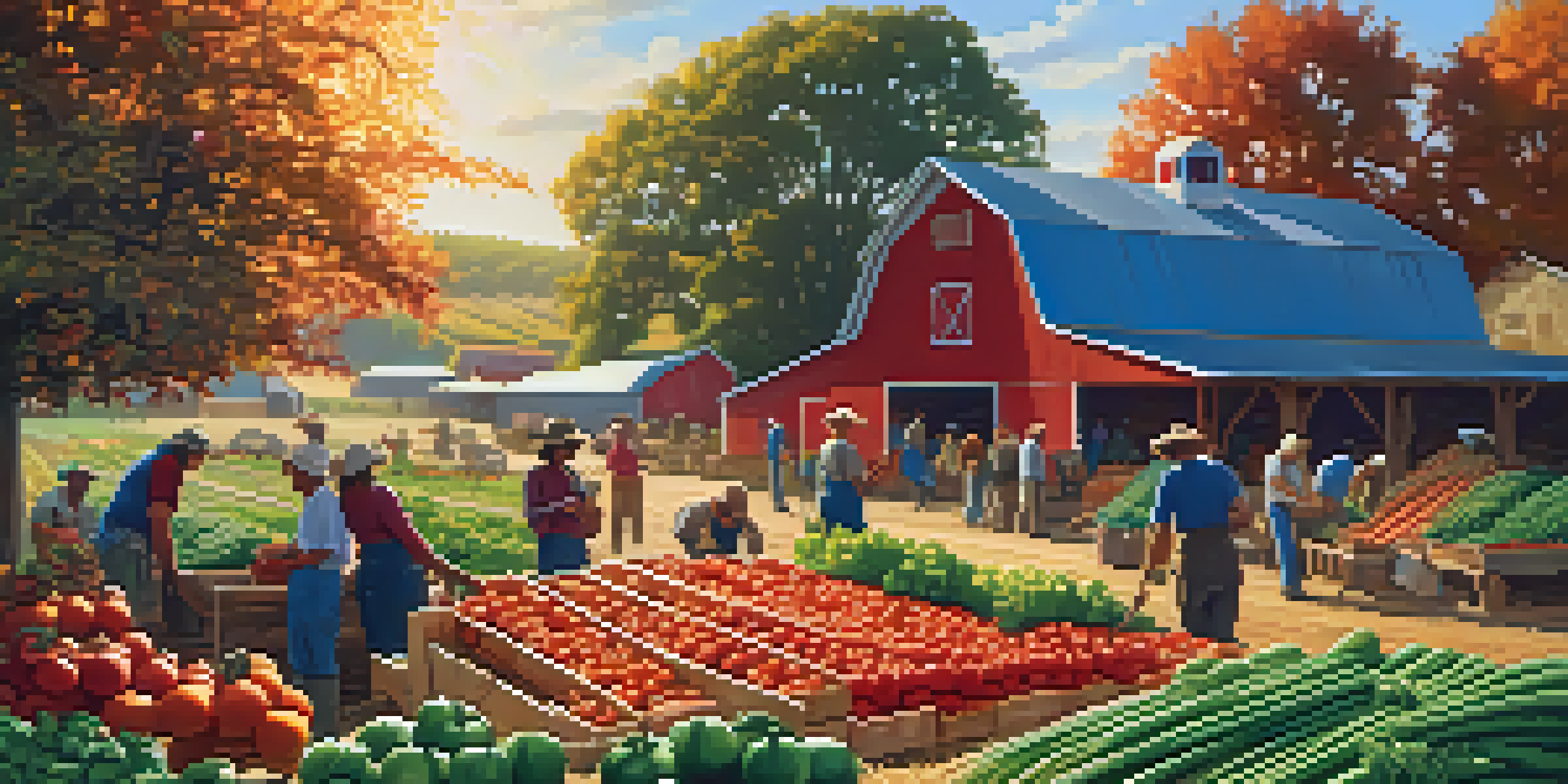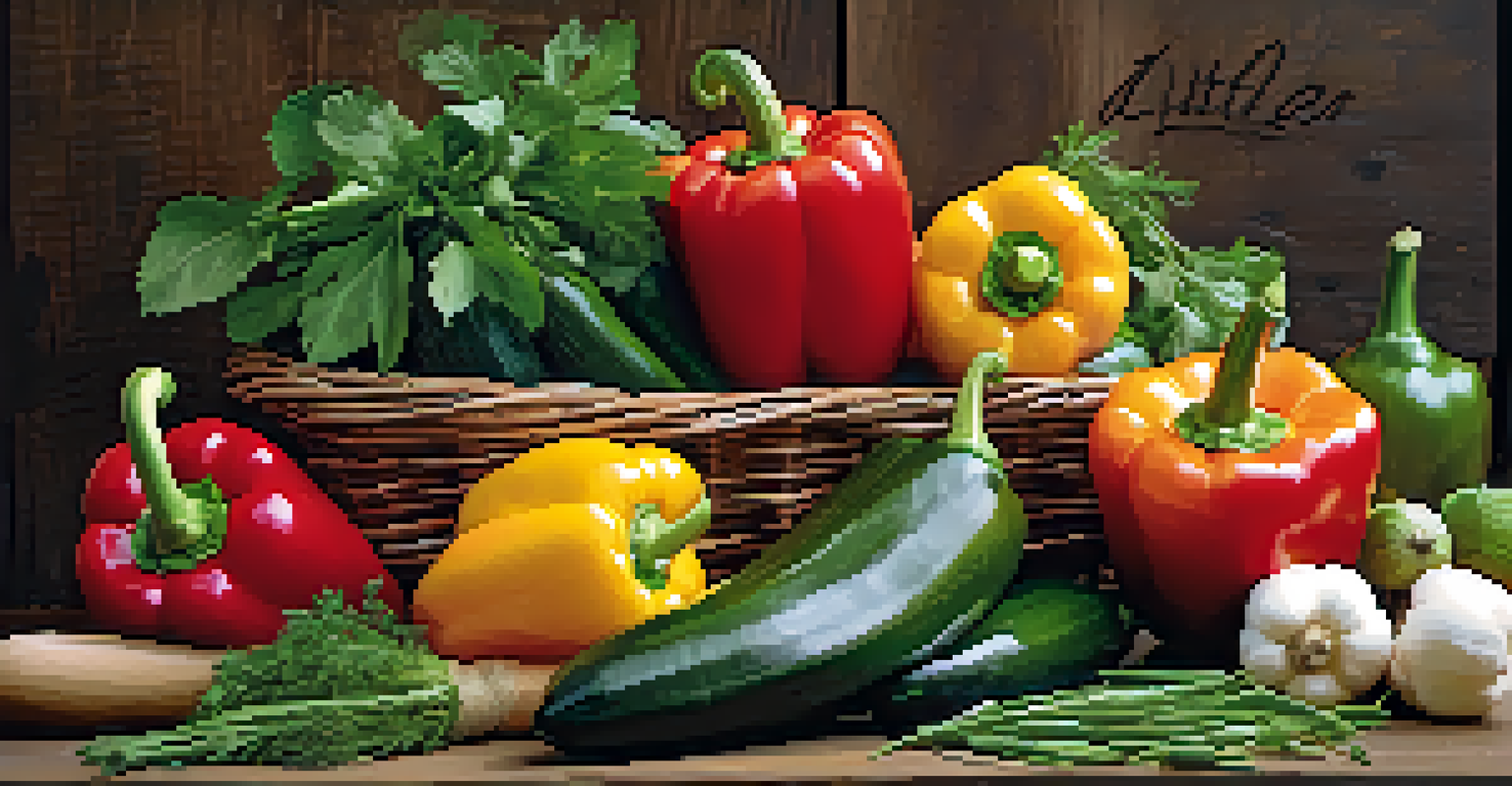Understanding Community Supported Agriculture's Role in Diets

What is Community Supported Agriculture (CSA)?
Community Supported Agriculture, or CSA, is a system where consumers buy shares of a farm's harvest in advance. This model allows farmers to receive upfront payment, helping them with cash flow and planning. In return, members receive a portion of the farm's produce throughout the growing season, often weekly. This direct relationship fosters a sense of community and connection to food sources, enriching the local economy.
When we eat from our local farms, we support the community and the environment. It's a win-win for everyone involved.
Members of a CSA often experience a variety of fresh, seasonal produce, which can introduce them to new fruits and vegetables. This not only diversifies their diet but also encourages healthier eating habits. By getting involved, individuals can learn about sustainable farming practices and the importance of supporting local agriculture. Plus, it’s a great way to connect with neighbors and share recipe ideas!
Overall, CSAs are a win-win for both farmers and consumers. They provide economic stability for local farms while giving members access to fresh, nutritious food. This model is gaining traction, especially as people become more conscious of where their food comes from.
Health Benefits of Eating Local Produce
Eating locally sourced food has numerous health benefits, primarily because it is fresher than produce that has traveled long distances. Fresh fruits and vegetables retain more nutrients, which can often diminish during transportation and storage. When you consume these nutrient-rich foods, you're giving your body the best chance to thrive and maintain optimal health.

Moreover, local produce is typically in season, meaning it's harvested at its peak ripeness. This not only enhances flavor but also increases the concentration of vitamins and minerals. Eating seasonally can also reduce the likelihood of foodborne illnesses, as local farms often have shorter supply chains and better practices for handling food.
CSAs Foster Community Connections
Community Supported Agriculture (CSA) creates a direct relationship between consumers and local farms, enriching both the local economy and food sources.
Additionally, supporting local agriculture can lead to improved mental well-being. Engaging with your food and knowing where it comes from can create a deeper appreciation for what you consume. This connection can foster healthier choices and promote a more balanced diet.
The Environmental Impact of CSAs
Community Supported Agriculture plays a significant role in reducing environmental impact. By sourcing food locally, CSAs minimize the carbon footprint associated with transporting food over long distances. This can lead to lower greenhouse gas emissions and a healthier planet.
Eating locally not only nourishes our bodies but also nourishes our community and our planet.
Moreover, many CSA farms practice sustainable farming techniques, which can include organic farming, crop rotation, and permaculture. These practices help maintain soil health, protect local biodiversity, and conserve water. By supporting these farms, members contribute to a more sustainable food system.
Lastly, being part of a CSA can inspire individuals to adopt more eco-friendly habits in their own lives. When people see the effort that goes into sustainable agriculture, they may be more inclined to make conscious choices, such as reducing waste and supporting local businesses.
How CSAs Promote Dietary Diversity
One of the most exciting aspects of joining a CSA is the variety of produce that members receive throughout the season. Farms often grow a diverse range of fruits and vegetables, which encourages consumers to explore new flavors and cooking techniques. This exposure can lead to more creative meals and a broader palate.
In addition, trying new ingredients can help individuals discover healthy alternatives to processed foods. For instance, if you receive a basket filled with unfamiliar vegetables, you might be motivated to find recipes that highlight their unique properties. This can spark a culinary adventure that enriches your diet.
Local Produce Enhances Health
Eating locally sourced produce offers superior freshness and nutrient retention, promoting better health and well-being.
Ultimately, dietary diversity is crucial for maintaining good health. A varied diet ensures that your body receives a wide range of nutrients necessary for optimal functioning. By participating in a CSA, members can easily incorporate this diversity into their meals.
Overcoming Challenges with CSAs
While CSAs offer many benefits, they can also present challenges for consumers. One common issue is the uncertainty surrounding the types and quantities of produce members will receive each week. This unpredictability can be daunting for those who prefer to plan their meals in advance.
Additionally, some people may find it difficult to use all the produce before it spoils, leading to food waste. To combat this, members can focus on meal prepping and utilizing creative recipes that incorporate a variety of ingredients. Engaging with the CSA community can also provide support and ideas for using up surplus produce.
It's important to remember that these challenges can be managed with a bit of flexibility and creativity. Embracing the seasonal nature of a CSA can lead to new culinary experiences and a deeper appreciation for the food you consume.
Finding and Joining a CSA
Joining a CSA is easier than you might think! Start by researching local farms that offer CSA programs in your area. Websites like LocalHarvest.org can help you find options nearby. Many farms also have social media pages or websites where they share information about their offerings and membership details.
Before committing, consider visiting the farm or attending an information session to learn more about their practices and what you can expect. This is also a great opportunity to ask questions about the types of produce offered, the length of the season, and payment options.
CSAs Support Sustainable Practices
By participating in CSAs, members help reduce environmental impact and promote sustainable farming techniques.
Once you find a CSA that aligns with your values and needs, signing up is typically straightforward. You'll complete a membership form and make a payment, securing your share of the harvest. From there, you can look forward to a bounty of fresh, local produce each week!
The Future of Community Supported Agriculture
As people become increasingly aware of health and environmental issues, the future of Community Supported Agriculture looks bright. More individuals are seeking connections to their food sources and prioritizing local, sustainable options. This growing interest is driving the expansion of CSA programs across the country.
Innovations in technology and social media are also making it easier for consumers to engage with CSA farms. Online platforms can streamline sign-ups, improve communication, and help members share their experiences. This fosters a sense of community that can encourage even more people to participate.

Ultimately, the rise of CSAs represents a shift towards a more sustainable and health-conscious food system. By supporting local farmers and embracing seasonal eating, individuals can contribute to a healthier planet and a more vibrant community.